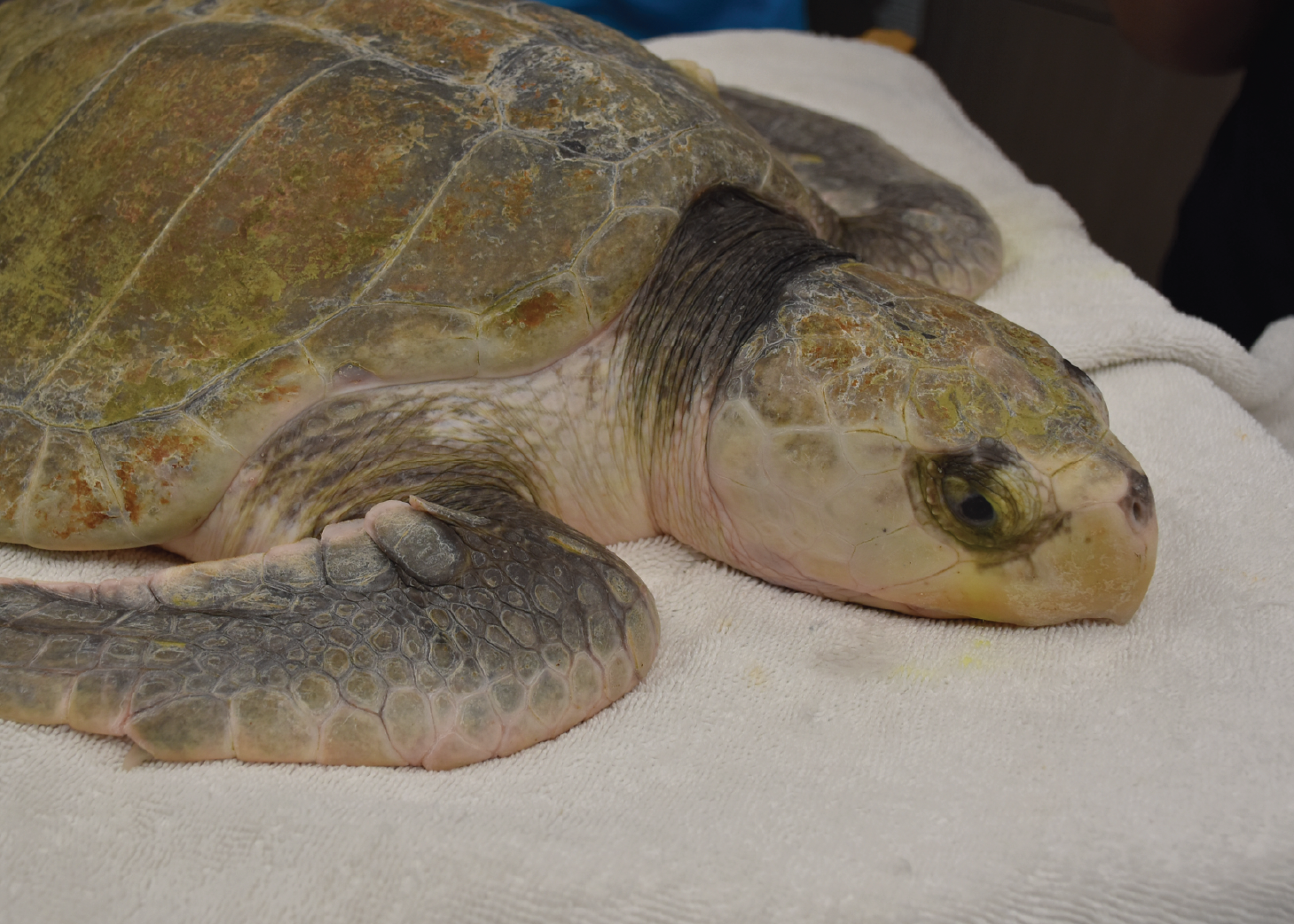Kemp’s ridley (Lepidochelys kempii)
Stranding Location: North Myrtle Beach, SC
Arrival Date: 4/26/2025
Age: Juvenile
Sex: Unknown
Weight: 6.97 kg (15.33 lbs.)
Case History
Petunia was accidentally hooked by a fisherman in North Myrtle Beach. Once notified, the South Carolina Department of Natural Resources (SCDNR) was able to coordinate the transport of Petunia to the Aquarium with the help of a permitted SCDNR volunteer.
Treatment
Petunia arrived in the late evening and was rather feisty, which showed us that s/he was resilient! With fish hook patients we always start with a radiograph to identify the location of the hook, and to our surprise Petunia had two fish hooks present! One was through the cheek while the other was embedded deep in the esophagus. In order to minimize stress, Petunia was sedated to begin a quick hook removal through the mouth. The hook in the cheek was successfully removed, however, we were unable to reach the deeper hook. Petunia was given antibiotics, fluids, pain medications and various vitamins before being placed in a tank to rest overnight.
Updates
April 29, 2025: After monitoring the location of the remaining fish hook through radiographs, we organized our team to perform a hook removal via surgery. The surgery went well and the hook was successfully removed — actually, the hook was stuck in a clump of shrimp that had been used as bait! After a few hours, Petunia was alert enough to be placed back into a tank. We monitored Petunia closely to make sure s/he was comfortable and could easily take breaths. Petunia is exhibiting floating behaviors, which appear to be a choice, rather than a medical problem. S/he is able to swim, dive and rest on the bottom. Normally when a turtle is exhibiting floating behaviors it is due to gas in the gastrointestinal tract or lung problems. After further assessment, we have determined that those do not seem to be issues for Petunia.
May 15, 2025: Petunia is no longer exhibiting the floating behaviors we were previously seeing, and has made many great strides the last couple of weeks! Petunia is now on a weighted diet and is eating really well! This is super important as all of the vitamins and nutrients in this diet will go towards fueling Petunia as s/he works to heal from surgery. Stop by to see Petunia on the first floor of the Aquarium!
June 15, 2025: In the last month, Petunia’s health has declined. S/he stopped eating and began losing weight. Usually, sudden and rapid weight loss is a sign that of larger health issues going on. We opted to move Petunia behind the scenes as we worked to determine what was happening.
Petunia has been suffering from a couple of different issues. First, we discovered a severe lung infection. To assess and treat the lung infection, we performed a bronchoscopy which involves using a very small camera to visually look inside of the lungs. During this procedure, we performed a bronchoalveolar lavage. This involves gently flushing the lungs with sterile saline, which is collected for pathological analysis. The analysis provides insight on the specific type of infection affecting Petunia’s lungs, allowing us to treat her/him more effectively.
The results of this procedure revealed that Petunia had a bacterial infection, which happened to be resistant to one of the antibiotics s/he was already receiving. Knowing this, we changed her medications to target this infection directly.
In addition, Petunia was dealing with a severe case of diarrhea. We immediately began administering daily fluids to prevent dehydration. We performed an ultrasound to assess Petunia’s gastrointestinal (GI) motility and found little to no movement of the material through her/his GI tract. S/he is now receiving an antibiotic and medication that helps increase GI contractility.
This new treatment plan seems to be helping! Petunia has regained her/his appetite and is eating the entire diet offered! In addition, Petunia’s weight has remained fairly consistent, and in the last few days we have begun to see more formed defecations, rather than diarrhea. Keep your flippers crossed for Petunia, s/he has a lot of healing to do and is hard at work!
July 15, 2025: Petunia has continued to improve this past month. Petunia’s appetite has grown and s/he is now eating a weighted percentage of body weight in fish. In addition to the previous care s/he has received, we added daily nebulization treatments to treat the lung infection. Based on a recent CT scan, her/his lung condition has vastly improved. In addition, the oral medications Petunia was on for severe diarrhea have also been hard at work. Ultrasound results revealed a considerable increase in GI motility and Petunia continues to pass more formed fecal material each day. The patient’s hydration levels and body condition are much improved and s/he has shown greater energy, too! Because of all of these exciting developments, we elected to move Petunia back upstairs to the deepest tank in Zucker Family Sea Turtle Recovery™. We are hoping the deep water will act as a form of physical therapy and exercise for her/his lungs. Stop by the Aquarium to spot Petunia swimming in this tank!
July 29, 2025: Surprise! Petunia was released at Folly Beach County Park! We are incredibly proud her/him for overcoming a difficult journey to recovery and wish s/he the best out in the big blue!


